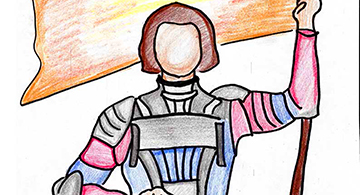 St. Joan of Arc is the patroness of soldiers and of France.
St. Joan of Arc is the patroness of soldiers and of France.
On January 6, 1412, Joan of Arc was born to pious parents of the French peasant class in the obscure village of Domremy, near the province of Lorraine. At a very early age, she was said to have heard the voices of St. Michael, St. Catherine, and St. Margaret.
At first the messages were personal and general, but when she was 13-years-old, she was in her father’s garden and had visions of Saint Michael, Saint Catherine, and Saint Margaret, each of whom told her to drive the English from French territory. They also asked that she bring the Dauphin to Reims for his coronation.
 When she was sixteen-years-old, she asked her relative, Durand Lassois, to take her to Vaucouleurs, where she petitioned Robert de Baudricourt, the garrison commander, for permission to visit the French Royal Court in Chinon.
When she was sixteen-years-old, she asked her relative, Durand Lassois, to take her to Vaucouleurs, where she petitioned Robert de Baudricourt, the garrison commander, for permission to visit the French Royal Court in Chinon.
Despite Baudricourt’s sarcastic response to her request, Joan returned the following January and left with the support of two of Baudricourt’s soldiers: Jean de Metz and Bertrand de Poulengy.
Once she had Baudricourt’s belief, Joan was granted an escort to Chinon through hostile Burgundian territory. For her safety, she was escorted while dressed as a male soldier, which later led to charges of cross-dressing, but her escorts viewed as a sound precaution
 When she arrived in the Royal Court, she met in a private conference with Charles VII and won his trust. Yolande of Aragon, Charles’ mother-in-law, planned a finance relief expedition to Orléans and Joan asked to travel with the army while wearing armor, which the Royal government agreed to. They also provided Joan’s armor and she depended on donations for everything she took with her.
When she arrived in the Royal Court, she met in a private conference with Charles VII and won his trust. Yolande of Aragon, Charles’ mother-in-law, planned a finance relief expedition to Orléans and Joan asked to travel with the army while wearing armor, which the Royal government agreed to. They also provided Joan’s armor and she depended on donations for everything she took with her.
In April 1429, the commission of inquiry “declared her to be of irreproachable life, a good Christian, possessed of the virtues of humility, honesty and simplicity.” Rather than deciding on whether or not Joan was acting on the basis of divine inspiration, theologians at Poitiers told the Dauphin there was a “favorable presumption” on the divine nature of her mission.
Charles was satisfied with the report but theologians reminded him Joan must be tested. They claimed, “[t]o doubt or abandon her without suspicion of evil would be to repudiate the Holy Spirit and to become unworthy of God’s aid.”
 During the five months prior to Joan’s arrival to Orléans, the French had only attempted one offensive assault, which resulted in their defeat, but after her arrival, things began to change.
During the five months prior to Joan’s arrival to Orléans, the French had only attempted one offensive assault, which resulted in their defeat, but after her arrival, things began to change.
Though Joan claimed the army was always commanded by a nobleman and that she never killed anyone in battle since she preferred only to carry her banner, which she preferred “forty times” better than a sword, several noblemen claimed she greatly effected their decisions since they accepted she gave Divinely inspired advice.
 After the Orléans victory, Joan was able to persuade Charles VII to allow her to march into other battles to reclaim cities, each of which ended in victory. When the military supplies began to dwindle, they reached Troyes, where Brother Richard, a wandering friar, had warned the city about the end of the world and was able to convince them to plant beans, which yields an early harvest. Just as the beans ripened, Joan and the army arrived and was able to restore their supplies.
After the Orléans victory, Joan was able to persuade Charles VII to allow her to march into other battles to reclaim cities, each of which ended in victory. When the military supplies began to dwindle, they reached Troyes, where Brother Richard, a wandering friar, had warned the city about the end of the world and was able to convince them to plant beans, which yields an early harvest. Just as the beans ripened, Joan and the army arrived and was able to restore their supplies.
 When the first public examination opened, Joan pointed out that the partisans were against her and she asked for “ecclesiastics of the French side” to provide balance, but her request was denied.
When the first public examination opened, Joan pointed out that the partisans were against her and she asked for “ecclesiastics of the French side” to provide balance, but her request was denied.
Jean Lemaitre, the Vice-Inquisitor of Northern France, objected to the trial from the beginning and many eyewitnesses later reported he was forced to cooperate after the English threatened to kill him. Other members of the clergy were threatened when they refused as well, so the trial continued.
The trial record includes statements from Joan that eyewitnesses later claimed astonished the court since she was an illiterate peasant who was able to escape theological traps. The most well-known exchange was when Joan was “[a]sked if she knew she was in God’s grace, she answered: ‘If I am not, may God put me there; and if I am, may God so keep me.'”
Despite the lack of incriminating evidence, Joan was condemned and sentenced to die in 1431.
Reference
https://www.catholic.org/saints/saint.php?saint_id=295



It works really well for me
Thanks to the wonderful guide